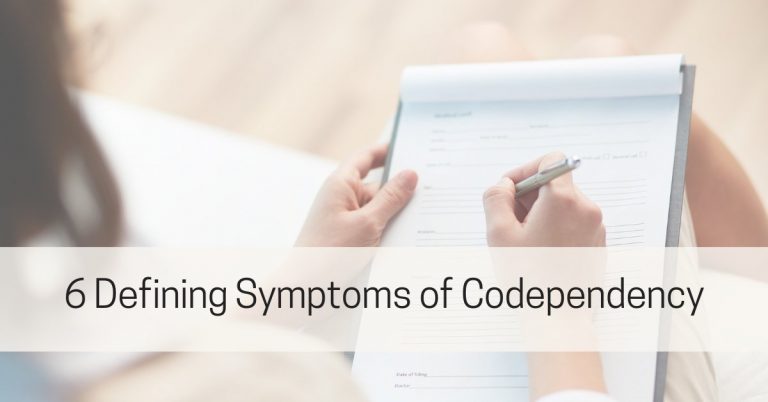
We use the term codependency rather loosely these days. It’s great that more people are familiar with codependency, but if it’s going to help us understand ourselves in a meaningful way, we need to be clear about what codependency is – and what it isn’t.
In a nutshell, people who identify as codependent usually play the role of caretaker or in a relationship with someone who is troubled or unwell in some way. You’re constantly trying to help, change, fix, or rescue. Caretaking may be central to your identity or give you a sense of purpose and self-esteem. Therefore, you become attached to people who have problems of various sorts and need to be taken care of.
In some ways, it’s wonderful to have a big heart and want to help. However, your focus on other people can lead to enabling and controlling behaviors, and it creates unbalanced relationships; your needs go unmet and you may become resentful and angry.
Codependency may seem straightforward, but it’s fairly complex. It usually stems from trauma and there is a wide array of codependency symptoms that exist on a continuum. So, you may be only slightly impacted by codependency or it may create major problems in your life.
Read on for a deeper look at codependency symptoms.
Symptoms of Codependency
Below are six of the defining characteristics of codependency: poor boundaries, a weak sense of self, unhealthy emotional dependency and caretaking, controlling behaviors, difficulty with intimacy, and being uncomfortable with emotions.
Boundary Problems
People with codependent tendencies often…
- have enmeshed relationships.
- share too much too fast in new relationships or have put up “walls” to keep people out.
- tolerate abusive, hurtful, or uncomfortable treatment.
- do things out of obligation or agree to do things even when it’s inconvenient or causes problems for them.
- are afraid of disappointing or offending others.
- feel responsible for fixing other people’s problems.
- “absorb” other people’s feelings.
Disconnection from Yourself and Low Self-Esteem
People with codependent tendencies often…
- don’t know what they like, want, need, value, etc.
- feel inferior or inadequate.
- fear abandonment.
- lack self-confidence.
- are people-pleasers.
- are sensitive to criticism.
- base their self-worth on other people’s opinions and seek validation from others.
- use perfectionism and achievements to feel worthy and accepted.
- don’t prioritize or feel worthy of self-care.
Unhealthy Emotional Dependency and Caretaking
People with codependent tendencies often…
- have a pattern of dating or befriending people who frequently have crises or problems and seem to need to be taken care of.
- are caretakers, sometimes sacrificing their own needs to help others.
- need to feel needed or fear abandonment if they’re not needed.
- act like martyrs, have trouble accepting help, and feel resentful when they aren’t appreciated.
- feel responsible for other people’s feelings and problems.
- enable others so they don’t suffer the negative consequences of their actions.
- accept blame for things they didn’t do or couldn’t control.
- have relationships with an obsessive quality (excessive worrying, inability to stop thinking about someone, compulsion to please or help).
- feel empty without a partner.
Controlling Behaviors
People with codependent tendencies often…
- give unsolicited advice.
- think there’s only one right way to do things.
- are inflexible.
- are critical.
- are afraid of losing control.
- are reactive.
- may use manipulation, guilt, or threats to try to control others.
Difficulty with Intimacy
People with codependent tendencies often…
- have difficulty trusting or are overly trusting.
- have difficulty being vulnerable.
- are afraid of being criticized, rejected, or abandoned.
- try to appear perfect so that others like or accept them.
Struggles Related to Emotions
People with codependent tendencies often…
- experience anxiety, depression, anger, shame, and guilt.
- struggle to identify their own feelings.
- suppress their emotions (they may have grown up in a home where they weren’t allowed to have feelings and/or their feelings weren’t validated or recognized).
- numb their feelings with alcohol, drugs, electronics, food, etc.
- have difficulty communicating their feelings and needs to others.
- Frequently feel on-edge or expect the worst.


Conclusion
You may recognize many—or just a few—of these symptoms of codependency in yourself (or in someone you care about). The number of symptoms you have is less important than how they are affecting you.
It can be hard to acknowledge our codependent traits and that codependency is disrupting our lives. We can suffer from denial and an inability to see just how dysfunctional we’ve become. I find it helps to write things down, so I can see them in black and white. Keeping a record of your symptoms, and how they affect you and your loved ones, over several weeks or months can help you to notice unhealthy behaviors and accept the role codependency plays in your life. This becomes the groundwork for change. Healing from codependency is possible!
©2024 Dr. Sharon Martin, LCSW. All rights reserved. Photos courtesy of Canva.com.
Related Articles
Source:Dr. Sharon Martin , www.livewellwithsharonmartin.com, [publish_date
Source Link